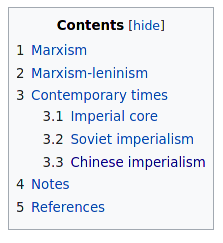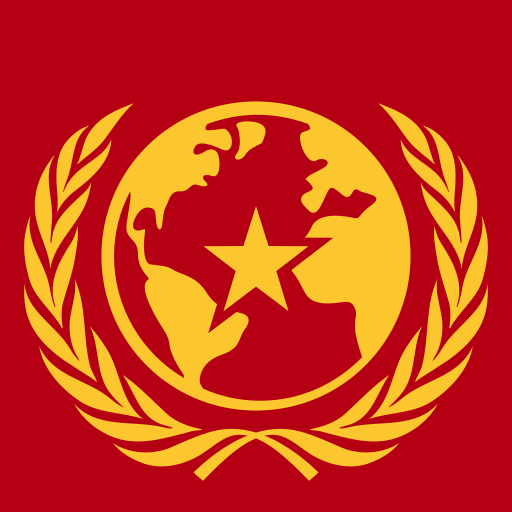I’ve been writing some stuff for prolewiki since yesterday, and I was wondering where we are going to stand on editorial practices?
Personally, while it’s difficult for me to write in that style, I think we should aim for a simple language (much like Parenti) that everyone can understand. There will have to be difficult articles, for example I’m thinking of economic theory from Capital, with equations and stuff… but overall I feel this project needs to be accessible. I would like to be able to tell my non-communist friends “if you’re interested, go on prolewiki” and they can handle it from there.
Which begs the next question: who exactly do we write for? In my articles, and that’s my personal outlook, I make sure to explain that what I’m about to say applies to Marxism-Leninism. Maybe it’s a given and we don’t need to spell it out. I feel it’s also important to present other points of view from a Marxist perspective, for example explaining the idealist outlook of liberalism on certain issues.
Likewise, about consistency, it’s important to know how we name articles. I see that the article about Karl Marx is just titled Marx, same with Stalin and Engels, and personally it seems more natural to me to have their full name as the title (Stalin is debatable since it was a pseudonym). In the same vein, which words do we capitalise when writing article titles? I.e. Economic Problems of the Soviet Union, Economic problems of the Soviet Union, Economic Problems Of The Soviet Union? Wikipedia uses the second option of capitalizing the first word and names only. So it would be Eastern Europe or Black Bloc, but Imperialism in the 21st century.
Like most people, my frame of reference for wikis is Wikipedia and its editorial practices speak to me. Source everything, make sure the front of the article is spotless and use the talk page to suggest changes, etc. It’s important to have consistency in the editorial tone so that everything feels like it was written by the same collective. Otherwise as you move from one article to the next, changes in writing style will make you wonder if you’re still on the same website and it looks amateurish.
I also tried adding sources to the article on imperialism, about how China forgives loans, but I couldn’t do that. Either it’s missing a template or I really have no idea how wikis work (which is true).
In the talk page for the imperialism article, I also suggested adding a Criticisms section to applicable articles as a standard practice. It would be cool to be able to address them directly from the article. Of course since it’s a wiki and anyone can edit it, we can’t really ask people to absolutely include this section if they want their article to stay up (we’re not fucking wikipedia lmao), but it would be cool to have this section pop up in more articles.
Perhaps down the line we should look for people who can help enrich articles? With sidebar stuff, pictures, sources, etc. People who can devote time to that over writing new articles.
-
Like most people, my frame of reference for wikis is Wikipedia and its editorial practices speak to me. Source everything, make sure the front of the article is spotless and use the talk page to suggest changes, etc. It’s important to have consistency in the editorial tone so that everything feels like it was written by the same collective. Otherwise as you move from one article to the next, changes in writing style will make you wonder if you’re still on the same website and it looks amateurish.
The Wikipedia style of editing is undialectical, and it’s made to be as bureaucratic, difficult and undemocratic as possible. However, we can learn useful things from that experience, such as consistent sourcing of articles and such. This does not mean we have to source everything now, we’re seeing Wikipedia’s example after decades of existence, after hundreds of thousands have contributed to its development.
The current approach is to just write what you know, and if any comrade finds anything wrong with your article, it gets fixed. Contradictions, that is, conflicts can be resolved in the discussion pages, where claims can be sourced and analyzed, and this enriches the articles.
But I’m glad you addressed this issue, and I’ve been promoting some editorial practices already, although I haven’t been vocal about it until now.
-
I also tried adding sources to the article on imperialism, about how China forgives loans, but I couldn’t do that. Either it’s missing a template or I really have no idea how wikis work (which is true).
yeah, me neither. I’m trying to figure it out too, and I fix it whenever possible. Your article on imperialism should be fixed by now, and you can see in the article source how it’s done (it can be done in the visual editor too in some cases, so keep bugging around with the features, and you’ll quickly find out).
-
In the talk page for the imperialism article, I also suggested adding a Criticisms section to applicable articles as a standard practice. It would be cool to be able to address them directly from the article. Of course since it’s a wiki and anyone can edit it, we can’t really ask people to absolutely include this section if they want their article to stay up (we’re not fucking wikipedia lmao), but it would be cool to have this section pop up in more articles.
The imperialism article you provided, as it’s currently presented, suggests there are and were such thing as Soviet and Chinese imperialism, as a material phenomenon. Take a look.

This should be avoided entirely. The article sections should be consistent with a clear understanding of the article as a whole. In the case of books, this can’t be avoided, because these books feature a lot of sections and in its current state is confusing. We’ll work it out with time.
-
Which begs the next question: who exactly do we write for? In my articles, and that’s my personal outlook, I make sure to explain that what I’m about to say applies to Marxism-Leninism. Maybe it’s a given and we don’t need to spell it out. I feel it’s also important to present other points of view from a Marxist perspective, for example explaining the idealist outlook of liberalism on certain issues.
We are writing for revolutionaries. ProleWiki should be accessible to all people, but we’re not going to risk the quality of our articles for the sake of simplicity. I think this is the best decision to make. And yes, our political line should be marxism-leninism, and we shall adhere to it, considering marxism-leninism continues to be the main political theory of communists today. Maoism sometimes has its merits, but most maoists, like anarchists, tend to have idealistic outlooks.
So I think marxism-leninism should be our main guiding theory when writing articles.
-
Likewise, about consistency, it’s important to know how we name articles. I see that the article about Karl Marx is just titled Marx, same with Stalin and Engels, and personally it seems more natural to me to have their full name as the title (Stalin is debatable since it was a pseudonym). In the same vein, which words do we capitalise when writing article titles? I.e. Economic Problems of the Soviet Union, Economic problems of the Soviet Union, Economic Problems Of The Soviet Union? Wikipedia uses the second option of capitalizing the first word and names only. So it would be Eastern Europe or Black Bloc, but Imperialism in the 21st century.
You may have noticed I write “marxism-leninism”, instead of Marxism-Leninism. I may not be a native English speaker, but I provide articles for English and I care about the language being understood, above all things. And we can see that English speakers have a tendency to capitalize every letter of a work, like the example you mentioned, “Economic Problems Of The Soviet Union”, instead of using the italics feature and presenting a more readable style: Economic problems of the Soviet Union.
We understand language as a ever-changing and transforming phenomenon, and we shouldn’t strictly obey grammatical rules without questioning the main purpose in communicating: to make language easier to read and understand. So, I propose that instead of Marxism-Leninism, we write marxism-leninism, because the “derived from proper nouns” rule implies Marxism is about Marx and Leninism is about Lenin, as if they aren’t a development from multiple processes throughout history. When we talk about philosophical outlooks, materialism isn’t capitalized, idealism isn’t capitalized, and why should marxism and marxism-leninism also be, considering it is also one philosophical outlook?
A lowercase approach to language makes it easier to read and understand. Just notice how German-speaking forums usually do not capitalize Nouns, like their grammatical conventions strictly tells them too. Grammatical rules, however, cannot dictate the language as it is presented in its practical use, this means the real language actually is the practical language, that is, the language spoken through linguistic practice outside the arbitrary grammatical structures. This also makes English closer to Latin languages, such as French, Portuguese, Spanish, Italian, which all feature lowercase names for philosophical outlooks like materialism and marxism-leninism.
We can discuss this in ProleWiki talk:Editorial conventions.
-


